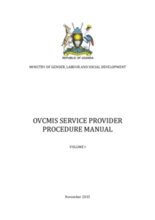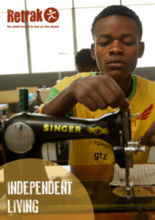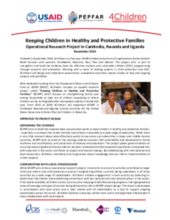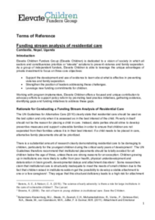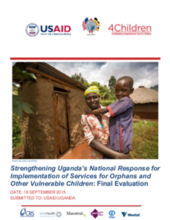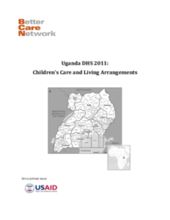This country page features an interactive, icon-based data dashboard providing a national-level overview of the status of children’s care and care reform efforts (a “Country Care Snapshot”), along with a list of resources and organizations in the country.
demographic_data
childrens_living_arrangement
children_living_without_bio
social_work_force
key_stakeholders
Key Stakeholders
Add New DataOther Relevant Reforms
Add New Datadrivers_of_institutionalisation
Drivers of Institutionaliziation
Add New Datakey_research_and_information
Key Data Sources
Add New DataThe Children Act (Uganda)
Country Care Review: Uganda
Prevalence and number of children living in institutional care: global, regional, and country estimates
The National Integrated Early Childhood Development Policy Action Plan (2016-2021) of Uganda
Catholic Care for Children in Uganda: A Family for Every Child - Findings from a Midterm Evaluation
Acknowledgements
Data for this country care snapshot was contributed by a consultant with the Data for Impact (D4I) Project at Palladium Group LLC.
Displaying 291 - 300 of 418
Police in the Masaka District of Uganda have closed down an illegal orphanage for children under the age of 10, according to the article.
The OVCMIS is one of the key instruments for effecting implementation of the National Strategic Programme Plan of Interventions for orphans and other vulnerable children (NSPPI).
This literature review explores current international and selected national policy on independent living arrangements and examines the evidence of good practice from existing independent living programmes for care leavers in order to assess how both of the above can be applied to street-connected children.
This two-page brief from USAID describes the “Keeping Children in Healthy and Protective Families” project, a project that is part of 4Children that “focuses on strengthening family care among households at high risk of children separating or where children can be reintegrated after having been placed in residential care.”
The Elevate Children Funders Group is seeking a consultant to conduct a funding stream analysis in three low-income countries (Cambodia, Nepal, and Uganda) in order to get a clearer understanding for the role private and government funding plays in promoting (versus discouraging) different forms of family and alternative care.
Strengthening Uganda’s National Response for Implementation of Services for Orphans and Other Vulnerable Children (SUNRISE-OVC) is a five-year project, which began June 2010, to deliver and monitor high quality, comprehensive and scaled-up services for OVC in 80 out of 112 districts in Uganda. The project was funded by USAID, working in partnership with the Government of Uganda’s (GoU) Ministry of Gender, Labour and Social Development (MGLSD) for oversight.
This country brief provides an overview of data on children’s living arrangements in Uganda, extracted from the 2011 DHS survey.
Institutions are invited to submit a proposal by 10:00 AM EST, 04 September 2015.
In this post, the organization Against Child Trafficking “call upon the Government of Uganda to immediately pass the Children’s Act revisions and allow Uganda and Ugandan laws to dictate local solutions for children, not foreign adoption agencies.”
The CPC Learning Network and UNHCR are collaborating to develop and test a Child Protection Index (CPI), a measure of strength of the child protection system in refugee settings, based on UNHCR’s Framework for the Protection of Children. This report details the results of the baseline study conducted from December 2014-February 2015 in Kiryandongo and Adjumani refugee settlements, Uganda.

